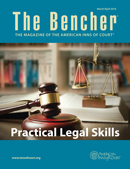Prosecutorial Discretion
The Bencher—March/April 2016
By Francis G.X. Pileggi, Esquire
 O
O ver the many years that I have written this ethics column,
the topics have mostly focused on court decisions applying the rules of
professional conduct and other standards governing lawyers. This time, I
review a ruling that addresses the concept of prosecutorial discretion.
ver the many years that I have written this ethics column,
the topics have mostly focused on court decisions applying the rules of
professional conduct and other standards governing lawyers. This time, I
review a ruling that addresses the concept of prosecutorial discretion.
This short article will highlight the key facts and issues
published in a recent California ruling that dismissed charges against a
lawyer who endured a trial based on an accusation that she failed to
maintain client funds in a trust account. The post-trial decision was issued by
a judge of the State Bar Court of California in the matter of Dianna Lynne
Albini.
The court’s opinion reviewed the evidence presented at a
three-day trial. The Office of Chief Trial Counsel of the State Bar of
California (State Bar) filed charges against respondent in November 2014. The
trial was held in September 2015. Respondent was admitted to practice law in
California in 1991. In 2007, she settled a personal injury matter. She withheld
$50,000 in escrow in order to cover a lien for medical bills. After she closed
her law practice, she was appointed as an administrative law judge in
2009. Apparently, California law only required her to keep her records for
five years, after which time she discarded them. Her custom was to send letters
to clients to give them notice prior to discarding their files. There is a
factual dispute in this matter whether or not that notice was sent or received,
and whether the medical bills were paid from respondent’s escrow account.
In 2014, after reviewing her files in the case, the client
for whom the respondent settled the personal injury matter, sent a letter to
the respondent asking about the status of the $50,000 held in escrow. By that
time, the respondent’s law practice was closed and the respondent was an
administrative law judge.
The trial revealed that the prosecutor’s investigator
contacted the potential lienholder and was told that there was no indication in
their records of any collection efforts to collect any outstanding amounts from
the client. If there were an unpaid amount or a lien, there would be an
indication of collection efforts, but there were none. As far as the potential
lienholder was concerned, the amount that would have been the subject of a
lien, should be considered as paid in full. Likewise, it should be emphasized
that neither a lien was asserted nor was the former client asked to pay the
amount that one could presume was paid from the sum withheld in the
respondent’s trust account.
In addition, the respondent testified at trial that her
recollection was that she paid the medical provider the full amount of $50,000
to satisfy and settle the slighter higher amount of medical bills for which
payment was due at the time of the personal injury settlement. The State Bar
had no contrary evidence that rose to the level of clear and convincing, which
was the standard the prosecution had to meet at trial. The State Bar knew that
it lacked such evidence prior to trial.
The records from the bank where the respondent’s trust
account was held were not complete. Nonetheless, the bank records that did
exist demonstrated that during the relevant time period amounts equal to the
sum withheld for the potential lien were paid to a third-party other than the
respondent.
Respondent was charged with misappropriating client funds,
which in this case, in California is a felony that, among other penalties, can
lead to disbarment. The trial judge found that the State Bar did not introduce
any affirmative evidence that respondent misappropriated funds. The court’s
opinion concluded that: “Considering this lack of proof and the documentary
evidence that the charges had been paid…,” there was no clear and convincing
evidence to find respondent culpable of misappropriation of funds. Likewise,
the trial judge found that there was insufficient evidence that respondent
failed to maintain properly the appropriate client funds in her trust account.
Therefore, the court dismissed with prejudice the two counts of professional
misconduct.
In the meantime, respondent was removed from her position as
an administrative judge. And where does she go to regain her tarnished
reputation?
Francis G.X. Pileggi, Esquire, is the member-in-charge of
the Wilmington, Delaware, office of Eckert Seamans Cherin & Mellott, LLC.
He summarizes the key corporate and commercial decisions of Delaware Courts at
www.delawarelitigation.com.
© 2016 Francis G.X. Pileggi, Esq. This article was
originally published in the March/April 2016 issue of The Bencher, a bi-monthly
publication of the American Inns of Court. This article, in full or in part,
may not be copied, reprinted, distributed, or stored electronically in any form
without the express written consent of the American
Inns of Court.